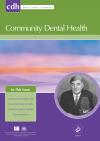Community Dental Health

- Cover Date:
- December 2016
- Print ISSN:
- 0265 539X
- Vol:
- 33
- Issue:
- 4
Approximal caries increment in relation to baseline approximal caries prevalence among adolescents in Sweden with and without a school-based fluoride varnish programme
Objective: Approximal surfaces are a focal point for caries prevention among adolescents in Sweden and the aims of this study were therefore to evaluate approximal caries incidence and caries progression among adolescents with and without a three-year school-based fluoride varnish programme in relation to approximal caries prevalence at baseline. Basic research design: In all, 758 (89%) 13-yearolds completed the three-year randomised controlled trial. They all used fluoride toothpaste at home and had regular dental check-ups at the public dental clinics. Results: The mean approximal caries incidence for the adolescents who were caries free on these surfaces at baseline was 0.13 (SD 0.54) in the fluoride varnish group and 0.79 (1.93) in the control group. The corresponding values for those who had caries at baseline in these groups were 1.29 (2.21) and 2.62 (3.22) respectively. The latter two groups also had 0.34 (1.00) and
0.70 (1.13) approximal enamel lesions that progressed. All differences were statistically significant (p<0.001). Among those individuals who had approximal caries at baseline, double the number of early approximal enamel lesions in the control group progressed compared with the fluoride varnish group. Conclusions: The school-based fluoride varnish programme inhibited new approximal lesions to a great extent and effectively kept approximal enamel lesions within the enamel among 13-16-year-olds. It is therefore recommended that such a programme is warranted when the approximal surfaces are still caries free in order to keep these surfaces free from caries and keep upcoming approximal enamel lesions within the enamel.
Key words: adolescent, caries incidence, caries prevalence, enamel lesions, fluoride varnish, oral health prevention, Sweden
doi:10.1922/CDH_3951Sköld05
- Article Price
- £15.00
- Institution Article Price
- £
- Page Start
- 281
- Page End
- 285
- Authors
- U.M. Sköld
Articles from this issue
- Title
- Pg. Start
- Pg. End
- An intervention study to assess the effectiveness of a reminder telephone call in improving patient appointment attendance at a Community Dental Service clinic
- 239
- 241
- Patient characteristics in relation to dental care payment model: capitation vs fee for service
- 252
- 256
- Psychometric properties of the English version of the Oral Health Literacy Adults Questionnaire - OHL-AQ
- 274
- 280
- Approximal caries increment in relation to baseline approximal caries prevalence among adolescents in Sweden with and without a school-based fluoride varnish programme
- 281
- 285
- Variation in methods used to determine national mean DMFT scores for 12-year-old children in European countries
- 286
- 291
- The relationship between maternal smoking during pregnancy and parental-reported experience of dental caries in Indigenous Australian children
- 297
- 302
- Dental problems and Familismo: social network discussion of oral health issues among adults of Mexican origin living in the Midwest United States
- 303
- 308
